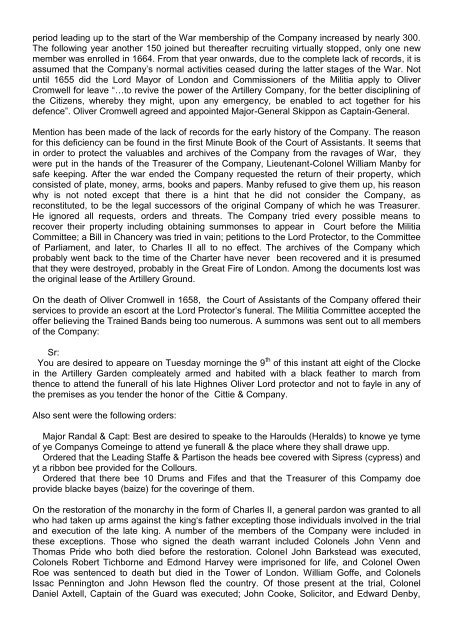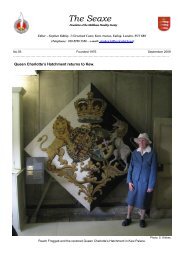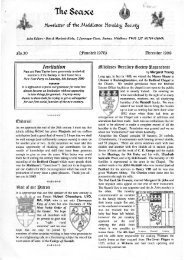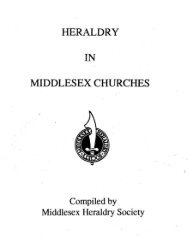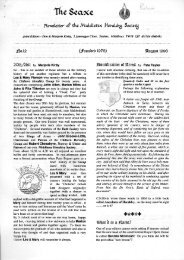No.57 - Middlesex Heraldry Society
No.57 - Middlesex Heraldry Society
No.57 - Middlesex Heraldry Society
You also want an ePaper? Increase the reach of your titles
YUMPU automatically turns print PDFs into web optimized ePapers that Google loves.
period leading up to the start of the War membership of the Company increased by nearly 300.<br />
The following year another 150 joined but thereafter recruiting virtually stopped, only one new<br />
member was enrolled in 1664. From that year onwards, due to the complete lack of records, it is<br />
assumed that the Company‟s normal activities ceased during the latter stages of the War. Not<br />
until 1655 did the Lord Mayor of London and Commissioners of the Militia apply to Oliver<br />
Cromwell for leave “…to revive the power of the Artillery Company, for the better disciplining of<br />
the Citizens, whereby they might, upon any emergency, be enabled to act together for his<br />
defence”. Oliver Cromwell agreed and appointed Major-General Skippon as Captain-General.<br />
Mention has been made of the lack of records for the early history of the Company. The reason<br />
for this deficiency can be found in the first Minute Book of the Court of Assistants. It seems that<br />
in order to protect the valuables and archives of the Company from the ravages of War, they<br />
were put in the hands of the Treasurer of the Company, Lieutenant-Colonel William Manby for<br />
safe keeping. After the war ended the Company requested the return of their property, which<br />
consisted of plate, money, arms, books and papers. Manby refused to give them up, his reason<br />
why is not noted except that there is a hint that he did not consider the Company, as<br />
reconstituted, to be the legal successors of the original Company of which he was Treasurer.<br />
He ignored all requests, orders and threats. The Company tried every possible means to<br />
recover their property including obtaining summonses to appear in Court before the Militia<br />
Committee; a Bill in Chancery was tried in vain; petitions to the Lord Protector, to the Committee<br />
of Parliament, and later, to Charles II all to no effect. The archives of the Company which<br />
probably went back to the time of the Charter have never been recovered and it is presumed<br />
that they were destroyed, probably in the Great Fire of London. Among the documents lost was<br />
the original lease of the Artillery Ground.<br />
On the death of Oliver Cromwell in 1658, the Court of Assistants of the Company offered their<br />
services to provide an escort at the Lord Protector‟s funeral. The Militia Committee accepted the<br />
offer believing the Trained Bands being too numerous. A summons was sent out to all members<br />
of the Company:<br />
Sr:<br />
You are desired to appeare on Tuesday morninge the 9 th of this instant att eight of the Clocke<br />
in the Artillery Garden compleately armed and habited with a black feather to march from<br />
thence to attend the funerall of his late Highnes Oliver Lord protector and not to fayle in any of<br />
the premises as you tender the honor of the Cittie & Company.<br />
Also sent were the following orders:<br />
Major Randal & Capt: Best are desired to speake to the Haroulds (Heralds) to knowe ye tyme<br />
of ye Companys Comeinge to attend ye funerall & the place where they shall drawe upp.<br />
Ordered that the Leading Staffe & Partison the heads bee covered with Sipress (cypress) and<br />
yt a ribbon bee provided for the Collours.<br />
Ordered that there bee 10 Drums and Fifes and that the Treasurer of this Compamy doe<br />
provide blacke bayes (baize) for the coveringe of them.<br />
On the restoration of the monarchy in the form of Charles II, a general pardon was granted to all<br />
who had taken up arms against the king„s father excepting those individuals involved in the trial<br />
and execution of the late king. A number of the members of the Company were included in<br />
these exceptions. Those who signed the death warrant included Colonels John Venn and<br />
Thomas Pride who both died before the restoration. Colonel John Barkstead was executed,<br />
Colonels Robert Tichborne and Edmond Harvey were imprisoned for life, and Colonel Owen<br />
Roe was sentenced to death but died in the Tower of London. William Goffe, and Colonels<br />
Issac Pennington and John Hewson fled the country. Of those present at the trial, Colonel<br />
Daniel Axtell, Captain of the Guard was executed; John Cooke, Solicitor, and Edward Denby,


